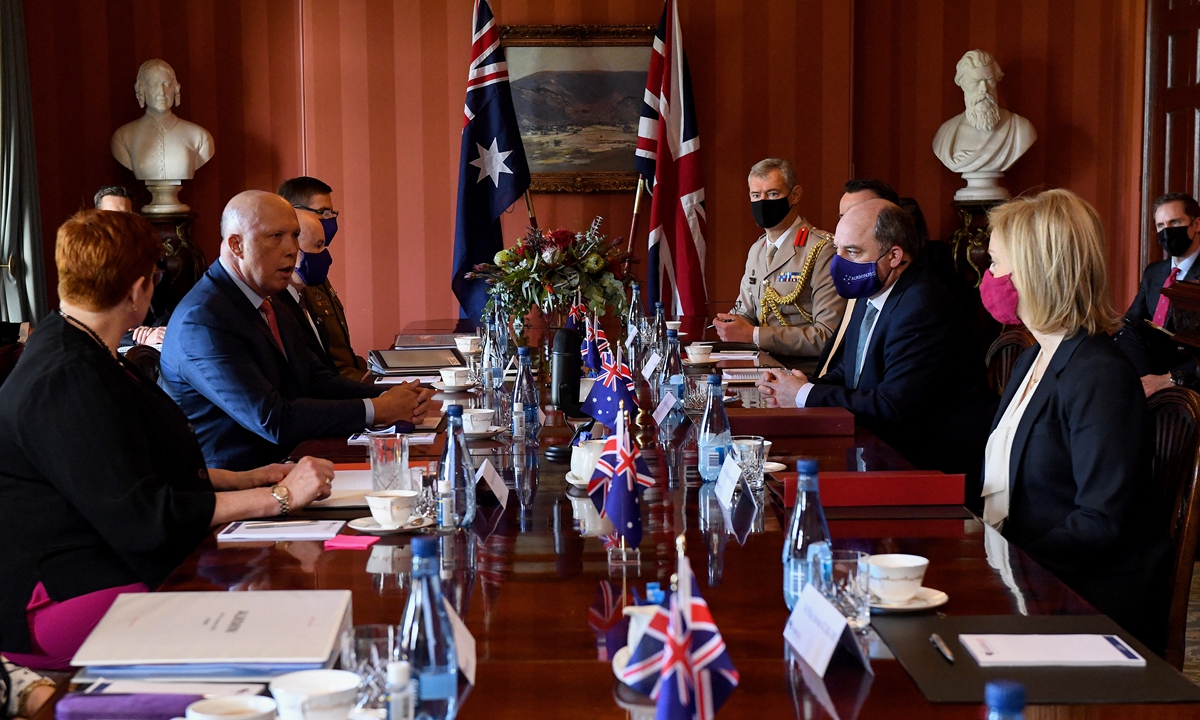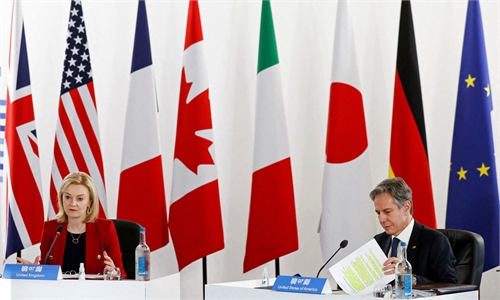China slams UK for following Cold War playbook
AUKUS security impact limited, aims economic decoupling

UK Australia 2+2 Photo: AFP
China warned the UK on Sunday not to follow the Cold War playbook, as it will lead it nowhere, after Britain's top foreign and defense officials talked with their Australian counterparts, aiming to advance AUKUS and convene an ideological clique to counter China and Russia.
The UK is following the US' strategy of wrestling with China on multiple fronts and its move not only shows Prime Minister Boris Johnson administration's attempt to shift focus from domestic affairs by stirring up troubles externally, but also reflects UK Foreign Secretary Liz Truss' own ambition of using an anti-China stance to amplify her political presence as a potential candidate to replace Johnson if he steps down or is ousted, some Chinese experts said.
"Today's world is a far cry from the one 40 or 50 years ago. The Cold War is long gone!" a spokesperson from the Chinese Embassy to the UK said in a statement on its website on Sunday in response to the latest comment made by Truss at the Lowy Institute of Australia on Friday. Truss is on an official visit to Australia. Truss mentioned China several times during her speech at Lowy, blaming China groundlessly for exerting "economic coercion" against other countries such as Lithuania and working more closely with Russia, according to a transcript released on the British government's website. Truss called on the UK and Australia to work with other countries to "defend economic security and freedom."
The accusations against China in this speech confuse right and wrong and raise questions about their real intention. They are full of disinformation about China as well as the current international situation, the Chinese embassy spokesperson said.
The remarks are parroting US rhetoric, drawing lines on ideological grounds and discrediting other sovereign countries regardless of facts. This is an attempt to justify the move to create small circles, which has inflicted a negative impact on regional peace and stability, according to the spokesperson.
The UK is probably doing this to show its value to the US. Moreover, Johnson is in a very shaky position because there are voices in and outside his party calling for his resignation, so Johnson is eager to show that he is making a difference in British diplomacy, Zhou Fangyin, a professor at the Guangdong Research Institute for International Strategies, told the Global Times on Sunday.
Coordination of the US, the UK and Australia was strengthened due to the AUKUS alliance, Zhou said. The expert pointed out one of the US key methods is to engage its allies to form anti-China alliances through the "2 + 2" dialogues.
The day when Australia and the UK joined hands to advance AUKUS, US President Joe Biden held a virtual meeting with Japanese Prime Minister Fumio Kishida during which they agreed to boost cooperation on economic and security issues including China's growing power, North Korea's alleged missile launches and Russia's perceived aims in Ukraine.
Cui Hongjian, director of the Department of European Studies at the China Institute of International Studies, told the Global Times on Sunday that AUKUS has given the UK more confidence to some extent, as one of its biggest gains from the pact is it can enter the Asia-Pacific region in the way of the so-called tripartite security alliance, and it wants to develop its own Indo-Pacific strategy.
The UK's Cold War playbook includes following the US to create an image of China-West opposition as well as using the so-called ideology and values to form military alliances to confront China on both military and diplomatic fronts, Cui said.
While the Johnson administration is facing pressure, Australia also has a federal election in 2022, so both countries have a common need to shift conflicts outward, Cui noted. "Truss is likely to succeed Johnson if the latter steps down, and Truss' anti-China remarks also arouse resonance in stirring up anti-China sentiments in Australia."
Zhou from the Guangdong Research Institute for International Strategies said with China's enhancing strength to secure security around the Indo-Pacific, AUKUS' impact will be limited in the military sense.
For the US, it is more aimed at using the military alliance to "decouple" from China economically, especially in high technology, and discredit China's image in the international community, the expert said.



